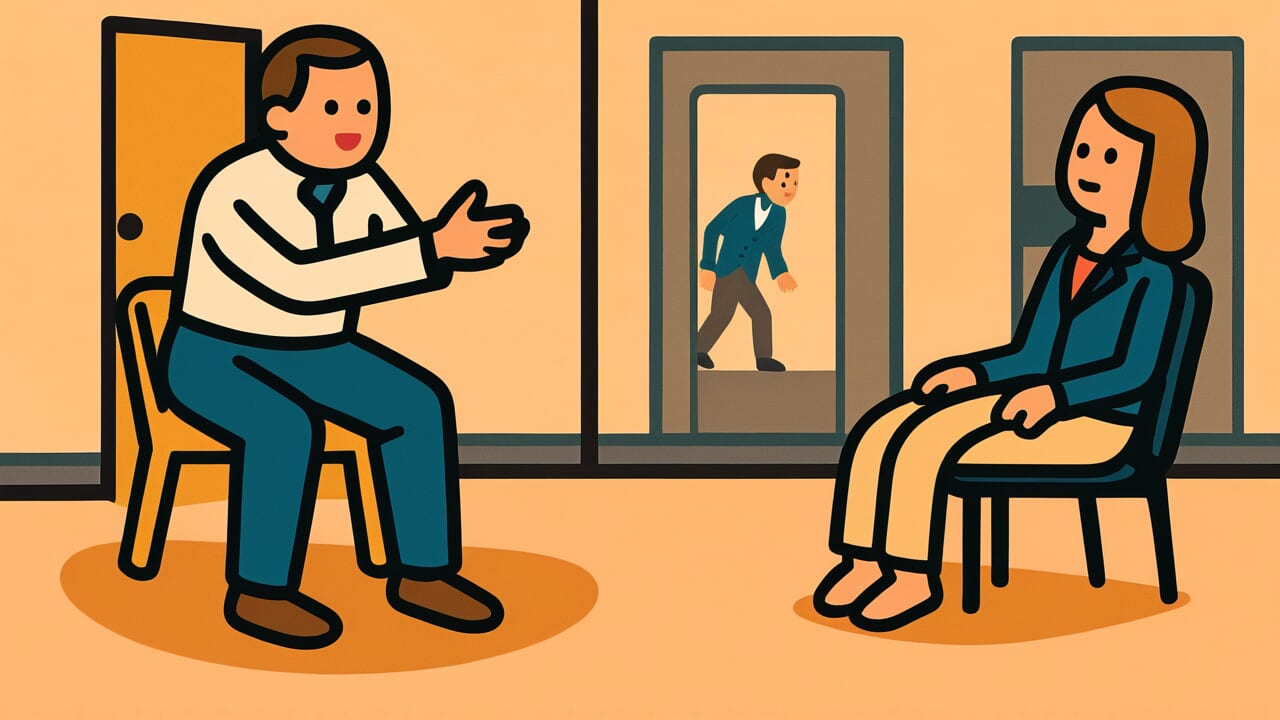How to Read “The talk stands but the legs and hips don’t”
Hanashi wa tatte mo ashikoshi tatanu
Meaning of “The talk stands but the legs and hips don’t”
This proverb criticizes people who say impressive things but fail to follow through with action. Their words are skillful and their logic sounds good, but when it’s time to actually do something, they can’t deliver.
It describes people who make wonderful proposals in meetings but don’t do the actual work. Or those who are great at talking about plans but disappear when it’s time to execute them.
The proverb points out the ironic situation where the more impressive someone’s words are, the more obvious their lack of action becomes.
Even today, this saying applies to people who post noble opinions on social media but do nothing in real life. Or those who only talk about ideals without making concrete efforts.
The lesson is clear: the power of words and the power of action are two different things. What truly matters is the ability to actually do something.
Origin and Etymology
The exact first appearance of this proverb in literature is unclear. However, based on its structure, scholars believe it emerged among common people during or after the Edo period.
The expression “the talk stands” means someone speaks skillfully and logically. Meanwhile, “the legs and hips don’t stand” literally means the body can’t move.
Here it’s used as a metaphor for lacking the power to take action.
What makes this contrast interesting is how it uses the same verb “stand” for two human abilities. The talk “stands” impressively, but the body won’t “stand” at all.
This creates an ironic situation expressed in a rhythmic phrase.
In Edo period common society, people enjoyed such expressions as satire against those who were all talk and no action. In the worlds of commerce and craftsmanship especially, actual work mattered more than words.
This proverb likely served as a warning against people who were only good at talking.
The choice of “legs and hips” is also noteworthy. Rather than just saying “legs don’t stand,” adding “hips” emphasizes the lack of fundamental power that forms the basis of action.
This saying has passed down the wisdom that both speaking ability and execution ability matter, and that balance between them is essential.
Usage Examples
- He talks passionately about environmental protection, but the talk stands but the legs and hips don’t—he doesn’t even sort his own garbage
- That person was more talkative than anyone in the new business planning meeting, but the talk stands but the legs and hips don’t—we haven’t seen them at all during the execution phase
Universal Wisdom
Humans have a strange duality. Between what we think in our heads and what we actually do with our bodies, there’s a gap far larger than we imagine.
This proverb sees through this fundamental human weakness.
Why can people say impressive things but fail to act? Because speaking words carries no risk. Talking about ideals feels good and makes us look smart.
But action comes with the fear of failure, effort, and responsibility. Humans instinctively choose the easier path.
This proverb has been passed down through generations because such people have existed in every era. And interestingly, we all recognize somewhere in our hearts that we have this tendency ourselves.
Our ancestors understood that the gap between words and actions is one of humanity’s greatest weaknesses to overcome. Knowledge and theory are easy to acquire, but the courage and persistence to execute them require a different dimension of strength.
This proverb demonstrates deep human understanding. As a warning to ourselves, it continues to resonate across time.
When AI Hears This
When you view the human body as an information processing system, remarkable performance differences emerge. Brain nerve signals travel at 100 meters per second, and language processing can recognize hundreds of phonemes per second.
Meanwhile, muscle contraction speed maxes out at about 10 meters per second. Supporting body weight against gravity requires massive amounts of energy.
In other words, the cost of moving your mouth versus moving your feet differs by over 100 times in energy efficiency.
In systems engineering, this is called the “rate-limiting step.” In chemical plants, even if reaction speed is fast, narrow pipes limit overall production.
In the human factory, the brain as a high-performance processor can generate words instantly, but the musculoskeletal system as physical infrastructure can’t keep up.
This is especially obvious in elderly people because muscle strength declines before nervous system deterioration. Even if cognitive function remains at 80%, you can’t stand if muscle strength drops to 50%.
Modern AI robots face the same problem. ChatGPT can write an essay in one second, but the robot arm executing it takes several seconds just to tighten one screw.
The gap between thinking speed and physical speed is an unavoidable constraint for both living things and machines. People in the Edo period empirically understood this universal system law.
Lessons for Today
What this proverb teaches you today is the importance of taking responsibility for your words. Now that expressing opinions through social media and email has become so easy, matching words with actions matters more than ever.
First, develop the habit of asking yourself “Can I actually do this?” before speaking. Taking a small but executable step is far more valuable than saying impressive things.
Starting to move, even imperfectly, matters more than talking about perfect plans.
This perspective also helps when evaluating others. You can develop an eye that sees actual behavior rather than being fooled by skillful words.
Truly trustworthy people act steadily without saying much.
To avoid becoming someone where the talk stands but the legs and hips don’t, why not start with small actions you can do today? Just by being conscious of reducing words and increasing actions, your credibility will surely grow.
After all, action is what proves your true value.



Comments